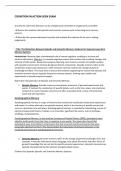COGNITION IN ACTION SEEN EXAM
1 Justify the claim that attention can be endogenously controlled or exogenously controlled.
v 2 Discuss the evidence that episodic and semantic memory exist as two long term memory
systems.
v 3 Describe the representativeness heuristic and evaluate the evidence for its use in making
judgements.
v Title: The Distinction Between Episodic and Semantic Memory: Evidence for Separate Long-Term
Memory Systems
Introduction: Memory plays a fundamental role in human cognition, enabling us to store and
retrieve information. Memory is a complex cognitive process that involves the encoding, storage, and
retrieval of information. Researchers propose that long-term memory consists of multiple systems,
with episodic and semantic memory being two distinct components. Episodic memory refers to the
recollection of personal experiences, while semantic memory involves the storage of general
knowledge and facts. This essay aims to discuss the evidence supporting the notion that episodic and
semantic memory exist as separate long-term memory systems, drawing upon studies and
experiments to provide empirical support.
Distinctive Characteristics of Episodic and Semantic Memory:
1. Episodic Memory: Episodic memory encompasses memories of personal experiences and
events. It involves the recollection of specific details, such as the time, place, and emotional
context of an event. Episodic memories are often associated with a sense of mental time
travel and self-awareness.
Autobiographical Memory:
Autobiographical memory is a type of memory that involves the recollection of personal experiences
and events. It is often referred to as episodic memory, which is the memory of specific events that
occur at a particular time and place. Autobiographical memory is essential for maintaining a sense of
identity and personal history. It allows us to remember significant life events, such as birthdays,
weddings, and graduations.
Autobiographical Memory: In one study by Conway and Pleydell-Pearce (2000), participants were
asked to recall events from their lives in response to cue words. The researchers found that
participants were more likely to recall events that had occurred recently and events that were
personally significant to them. This demonstrates the importance of personal relevance in the
encoding and retrieval of autobiographical memories.
2. Semantic Memory: Semantic memory refers to the storage of general knowledge, facts, and
concepts. It includes information about language, facts about the world, and other forms of
general knowledge that are not tied to specific personal experiences. Semantic memories are
typically characterized by their abstract and generalized nature.
Evidence for Separate Episodic and Semantic Memory Systems:
, 1. Patient Studies: Research conducted with patients who have experienced brain damage has
provided significant evidence for the dissociation between episodic and semantic memory.
For instance, individuals with damage to the medial temporal lobe, including the
hippocampus, often exhibit severe impairments in episodic memory while retaining intact
semantic memory (Squire, 1992). This supports the idea that these two memory systems rely
on distinct brain structures and processes.
2. Neuroimaging Studies: Neuroimaging techniques, such as functional magnetic resonance
imaging (fMRI), have revealed distinct patterns of brain activation associated with episodic
and semantic memory tasks. Studies have shown that episodic memory tasks engage regions
such as the hippocampus and prefrontal cortex, while semantic memory tasks involve areas
such as the lateral temporal cortex and anterior temporal lobe (Binder & Desai, 2011;
Ranganath & Ritchey, 2012). These findings provide further support for the existence of
separate neural substrates underlying these memory systems.
3. Developmental Studies: Research on memory development in children has also provided
insights into the distinction between episodic and semantic memory. Children typically
exhibit a gradual emergence of episodic memory, with earlier development of semantic
memory. Longitudinal studies have demonstrated that episodic memory, involving the ability
to recall personal events, develops later and is more dependent on the maturation of the
prefrontal cortex and hippocampus (Bauer, 2007).
4. Experimental Manipulations: Experimental studies have employed various manipulations to
demonstrate the distinction between episodic and semantic memory. For instance,
recognition memory tasks can differentiate between memory for specific details (episodic
memory) and memory for general knowledge (semantic memory). These studies have
consistently shown that different brain processes and retrieval strategies are involved in
episodic and semantic memory tasks (Diana et al., 2007; Yonelinas, 2002).
Conclusion: The evidence presented in this essay strongly supports the notion that episodic and
semantic memory exist as separate long-term memory systems. Patient studies, neuroimaging
research, developmental studies, and experimental manipulations consistently demonstrate the
dissociation between these two memory systems. Understanding the distinct characteristics and
neural mechanisms of episodic and semantic memory contributes to our broader comprehension of
human cognition and memory processes
Conway, 2000 – recalling life events in response to cue words experiment
Squire, 1992 – severe hippocampus impairment in EM (not SM)
Binder, 2011 – EM task engage hippocampus area, SM task involve lateral temporal cortex area
Bauer, 2007 – EM develops later, depends on the maturation of the hippocampus
Diana et al., 2007 – recognition memory task differentiate btw EM and SM




